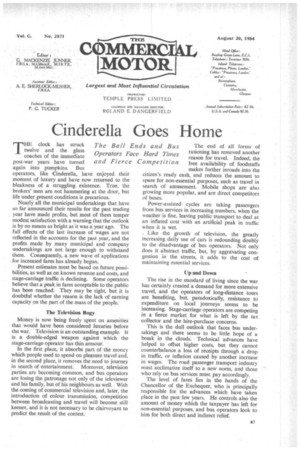Cinderella Goes Home
Page 37

If you've noticed an error in this article please click here to report it so we can fix it.
THE clock has struck twelve and the glass coaches of the immediate post-war years have turned again into pumpkins. Bus operators, like Cinderella, have enjoyed their moment of luxury and have now returned to the bleakness of a struggling existence. True, the brokers' men are not hammering at the door, but life under present conditions is precarious.
Nearly all the municipal undertakings that have so far announced their results for the past trading year have made profits, but most of them temper modest satisfaction with a warning that the outlook is by no means as bright as it was a year ago. The full effects of the last increase of wages are not reflected in the accounts for the past year, and the profits made by many municipal and company undertakings are not large enough to withstand them. Consequently, a new wave of applications for increased fares has already begun.
Present estimates must be based on future possibilities, as well as on known revenue and costs, and stage-carriage traffic is declining. Some operators believe that a peak in fares acceptable to the public has been reached. They may be right, but it is doubtful whether the reason is the lack of earning capacity on the part of the mass of the people.
The Television Bogy Money is now being freely spent on amenities that would have been considered luxuries before the war. Television is an outstanding example. It is a double-edged weapon against which the stage-carriage operator has thin armour.
In the first place, it absorbs part of the money which people used to spend on pleasure travel and, in the second place, it removes the need to journey in search of entertainment. Moreover, television parties are becoming common, and bus operators are losing the patronage not only of the televiewer and his family, but of his neighbours as well. With the coming of commercial television and, later, the introduction of colour transmission, competition between broadcasting and travel will become still keener, and it is not necessary to be clairvoyant to predict the result of the contest. The end of all forms of rationing has removed another reason for travel. Indeed, the free availability of foodstuffs makes further inroads into the citizen's ready cash, and reduces the amount to spare for non-essential purposes, such as travel in search of amusement. Mobile shops are also growing more popular, and are direct competitors of buses.
Power-assisted‘ cycles are taking passengers from bus services in increasing numbers, when the weather is fine, leaving public transport to deal at an inflated cost with an artificial peak in traffic when it is wet.
.Like the growth of television, the greatly increasing daily use of cars is redounding doubly to the disadvantage of bus operators. Not only does it abstract traffic, but, by aggravating congestion in the streets, it adds to the cost of maintaining essential services.
Up and Down The rise in the standard of living since the war has certainly created a demand for more extensive travel, and the operators of long-distance tours are benefiting, but, paradoxically, resistance to expenditure on local journeys seems to be increasing. Stage-carriage operators are competing in a fierce market for what is left by the tax collector and the hire-purchase concerns.
This is the dull outlook that faces bus undertakings and there seems to be little hope of a break in the clouds. Technical advances have helped to offset higher costs, but they cannot counterbalance a loss of receipts through a drop in traffic, or inflation caused by another increase in wages. The road passenger transport industry must acclimatize itself to a new norm, and those who rely on bus services must pay accordingly.
The level of fares lies in the hands of the Chancellor of the Exchequer, who is principally responsible for the advances which have taken place in the past few years. He controls also the amount of money which the taxpayer has left for non-essential purposes, and bus operators look to him for both direct and indirect relief.




































































































